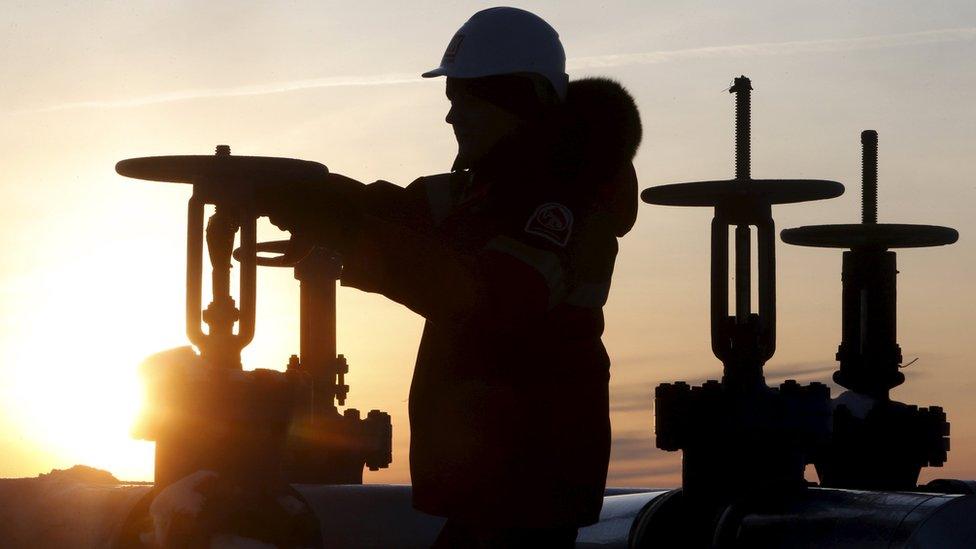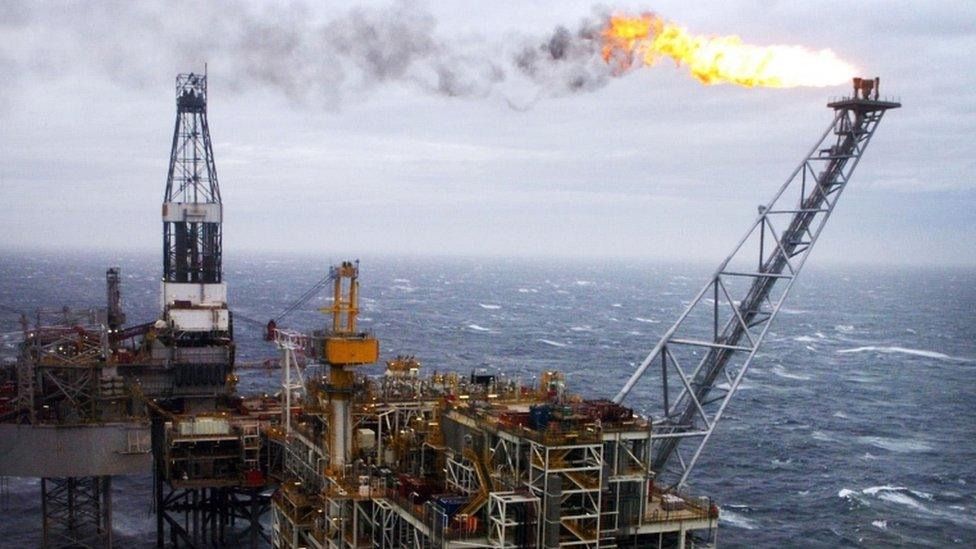Huge drop in oil and gas jobs since 2014
- Published

The number of jobs relying on the UK's offshore oil and gas sector has fallen by more than quarter in the past two years, according to an industry report.
In a second year of severe cuts in cost, the industry is thought to be supporting 120,000 fewer jobs than in 2014.
The annual economic report from Oil and Gas UK shows the impact this year is increasingly on the supply chain.
Spending is down by 30% in two years as a result of the oil price fall.
The report also points to a further deterioration in prospects if exploration is not stepped up.
Only six wells have been sunk in UK waters this year in search of new reservoirs of oil and gas.
For every barrel newly found, four are being extracted from existing fields.
The industry body says that is "unsustainable", and is calling for more effort to encourage drilling.
The last year that more oil and gas was found than produced was in 1990.
The report also showed exploration and production firms are cutting the amount of their known oil and gas reserves they believe to be commercially viable, as marginal fields become "stranded".
This year has so far seen little new commitment of capital funds. Whereas £4.3bn of investment capital was committed to new projects last year, that has fallen to only £100m so far this year.

Britain's oil and gas industry at a glance
30% drop in UK gas demand since 2004
0.2% rate of return for extraction companies in January-March 2016: more than 50% in 2011
6 exploration wells 'spudded' (begun) so far this year
30% drop in the number of development wells in 2016
£19bn total expenditure, down from £26.6bn in 2014 and £21.7bn in 2015
1 new field approved this year, with a £100m budget: 5 last year, worth 43 times more
45% drop in the cost of producing the average barrel of oil
6% rise in production, after a 10% rise in 2015
21st biggest oil and gas producer in 2015, with 1.1% of global production.
330,000 jobs supported, 34,000 of them direct employees, 151,000 indirect.
Less than zero production tax paid in 2015-16, due to low profitability and tax allowances

Recent high levels of capital spending have helped turn around the sharp decline in production since the start of this century.
Oil output rose 9% last year, and gas by 1%. In the first half of this year, oil production was up around 6%.
But with the oil price averaging $41 per barrel in the first eight months of this year - just over a third of the level in summer 2014 - capital spending is now falling rapidly.
It has gone from £14.8bn two years ago to an estimated £9bn this year, with further declines forecast.
Total expenditure, including capital and operating costs, has fallen from £26.6bn in 2014 to £21.7bn last year, and this year it is expected to reach £19bn.
But such a drop was seen as necessary. The industry is claiming a striking achievement in cutting the cost of extracting the average barrel of oil, down from $29 to $16 by the end of this year.

International comparisons suggest that is not all due to the slashing of prices by supply companies as they struggle to win orders. It is partly credited to efficiency measures in what had become one of the world's most expensive regions for oil extraction.
The economic report estimates the employment implications of the industry downturn. It says the 27% drop in only two years has not been felt most severely in direct employment within the production sector. It is now estimated at 34,000, down from 42,000 in 2014.
Indirect employment, in the supply chain, has fallen to 151,000, according to the industry report, down from 201,000 two years ago.
The wider calculation of "induced" jobs, supported by industry expenditure, is reckoned to be down from 211,000 to 145,000.
Scotland is the base for four out of five directly-employed jobs - 27,000 roles - but a lower proportion of indirect jobs (41% or 51,000) and of induced jobs (24% and 35,000).
Profits have plummeted. In 2011, the average rate of return for extraction companies was more than 50%: at the start of this year, it was 0.2%. Tax revenue has turned negative.
'Production decline'
Deirdre Michie, chief executive of Oil and Gas UK, said the UK vote in June to leave the European Union was adding complexity "in an already testing business environment".
In the short term, she said there was "the distraction from managing our way through the downturn, a loss of positive influence over ongoing and future policy development in Brussels, and uncertainty, making it difficult for our members to make longer-term investment decisions".
She said: "The lack of new development projects must be urgently addressed if we are to avoid a repeat of the sharp production decline that dominated the early part of this decade.
"Exploration has fallen to record lows. Little new investment has been approved in 2016, and 2017 looks no better."
Ms Michie argued the government could do more to encourage asset sales, bringing more companies into investment in the specialist challenge of handling oil and gas fields as they near closure. That includes clarity on the liabilities for decommissioning costs.
The chief executive said: "The evidence in the report demonstrates what our industry can achieve when the basin's competitiveness is addressed, and the tax regime reformed.
"Now it is time for the UK and Scottish governments to reinforce their efforts to promote the UK [industry], nationally and internationally, as an attractive investment with world-leading capability from front-end exploration to late-life operations."